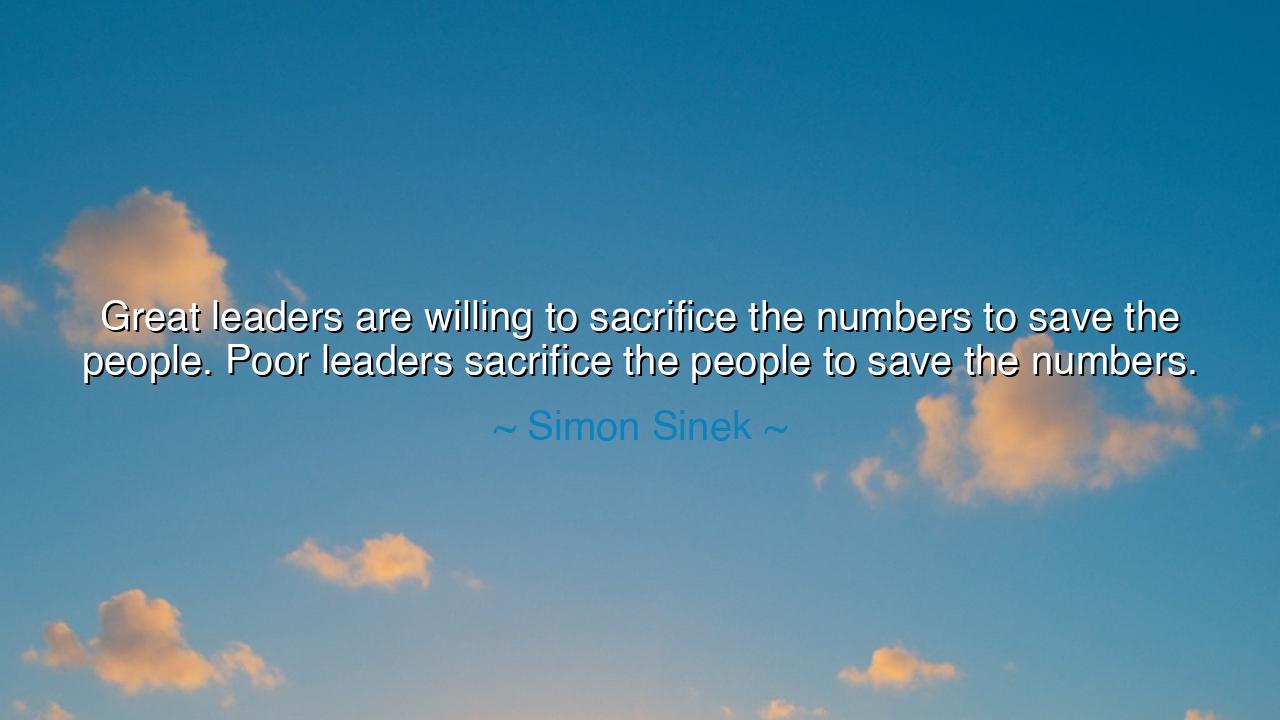
Great leaders are willing to sacrifice the numbers to save the
Great leaders are willing to sacrifice the numbers to save the people. Poor leaders sacrifice the people to save the numbers.






Hear, O listeners and builders of nations, the words of Simon Sinek, who spoke thus: “Great leaders are willing to sacrifice the numbers to save the people. Poor leaders sacrifice the people to save the numbers.” In these few words lies the essence of true leadership—a timeless principle that separates the guardian from the tyrant, the servant from the master, the shepherd from the wolf. It is a truth that echoes through the halls of history and the chambers of the human heart: that the measure of greatness is not how much one gains, but how much one is willing to give for the sake of others.
Sinek’s words were born in an age of corporations and conflict, where leaders are often tempted to see people as numbers on a ledger, as assets to be managed rather than souls to be cared for. Yet the wisdom within his quote reaches far beyond boardrooms and armies. It belongs to the eternal order of things. The great leader, whether king, commander, or teacher, understands that people are not expendable—they are the heartbeat of every endeavor. Numbers may sustain an organization, but people sustain its spirit. A company, a kingdom, or a cause that forgets this truth begins to die long before it falls.
History offers many lessons of this divide. In the dark days of World War II, when Britain stood alone against tyranny, Prime Minister Winston Churchill faced decisions that would shape the fate of civilization itself. Factories lay in ruins, rations were scarce, and the numbers foretold despair. Yet Churchill did not bow to them. He did not sacrifice the morale of his people to preserve statistics of safety or efficiency. Instead, he spoke to their hearts, reminding them that they were not numbers, but guardians of freedom. And though bombs fell and cities burned, the spirit of the people endured. In saving their dignity, he saved his nation.
By contrast, history is filled also with the ruin of poor leaders, those who sacrificed people to protect numbers—emperors who starved their subjects to sustain empires, executives who dismissed workers to please shareholders, commanders who sent men to death for the illusion of progress. Their victories were hollow and short-lived, for they forgot the law written in the soul of all good leadership: to lead is to serve. The leader who saves himself at the cost of his people inherits ashes; the one who sacrifices himself for them builds something eternal.
Sinek’s teaching also reveals a moral paradox: that numbers, though they seem rational, can become idols. When leaders serve numbers—profits, ratings, metrics—they lose sight of humanity. The great leader, however, knows that numbers are tools, not masters. He uses them to strengthen his people, not to measure their worth. This is why true greatness cannot be calculated—it is felt, not counted. It exists in the loyalty of the led, the trust they give freely, and the love they hold for one who leads them with compassion.
Let us look to another story: that of Captain Ernest Shackleton, the explorer who led his crew through the frozen hell of the Antarctic. When their ship, the Endurance, was trapped and crushed by ice, Shackleton’s mission changed. No longer did he seek glory or discovery—he sought only to bring his men home alive. He rationed his own food, shielded them from despair, and risked his life again and again to rescue them. He lost the expedition’s purpose, but he saved every soul under his command. Shackleton understood, as Sinek later would, that no number, no record, no success is worth the loss of human life or trust.
The lesson, then, is clear and eternal: leadership is stewardship. The leader is not the owner of his people’s labor but the guardian of their hope. If you lead others—be it a company, a classroom, a home—remember this law. When the time of testing comes, choose the living over the measurable, the human over the profitable. For it is not the wealth of a nation, but the well-being of its people, that marks the rise of civilization.
Thus, the words of Simon Sinek endure as a torch in the darkness of ambition. They remind us that the true leader walks not ahead of his people but among them, bearing their burdens, sharing their trials, and lighting their path. Numbers may record his deeds, but it is hearts that remember him. And in the end, it is not the sum of wealth or victories that defines greatness—it is the humanity one preserves in the face of power.






AAdministratorAdministrator
Welcome, honored guests. Please leave a comment, we will respond soon